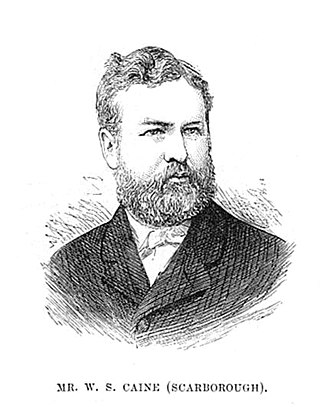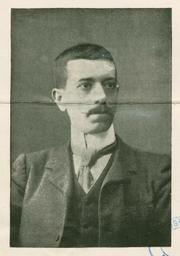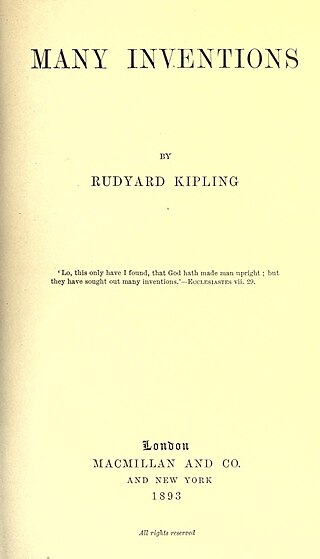Related Research Articles

Joseph Rudyard Kipling was an English journalist, novelist, poet, and short-story writer. He was born in British India, which inspired much of his work.
This is a bibliography of works by Rudyard Kipling, including books, short stories, poems, and collections of his works.

"The Man Who Would Be King" (1888) is a story by Rudyard Kipling about two British adventurers in British India who become kings of Kafiristan, a remote part of Afghanistan. The story was first published in The Phantom 'Rickshaw and Other Tales (1888); it also appeared in Wee Willie Winkie and Other Child Stories (1895) and numerous later editions of that collection. It has been adapted for other media a number of times.

Perceval Landon (1869–1927) was an English writer, traveller and journalist, now best remembered for his classic and much reprinted ghost story "Thurnley Abbey".

John Lockwood Kipling was an English art teacher, illustrator and museum curator who spent most of his career in India. He was the father of the author Rudyard Kipling.

A. H. Wheeler & Co. Pvt. Ltd., commonly known as A. H. Wheeler or simply Wheeler, is an Indian-owned company that owns a bookstore chain. Co-founded by Émile Moreau, a French businessman, T. K. Banerjee, an Indian businessman, and others, in Prayagraj in 1877, it mainly operates from railway stations.

"Danny Deever" is an 1890 poem by Rudyard Kipling, one of the first of the Barrack-Room Ballads. It received wide critical and popular acclaim, and is often regarded as one of the most significant pieces of Kipling's early verse. The poem, a ballad, describes the execution of a British soldier in India for murder. His execution is viewed by his regiment, paraded to watch it, and the poem is composed of the comments they exchange as they see him hanged.
"The Rescue of Pluffles" is a short story by Rudyard Kipling. Its first appearance in book form was in Kipling's first collection of short stories, Plain Tales from the Hills (1888); it was first published in the Civil and Military Gazette on November 20, 1886. It centres on Mrs Hauksbee, and begins
Mrs. Hauksbee was sometimes nice to her own sex. Here is a story to prove this; and you can believe just as much as ever you please.
Soldiers Three is a collection of short stories by Rudyard Kipling. The three soldiers of the title are Learoyd, Mulvaney and Ortheris, who had also appeared previously in the collection Plain Tales from the Hills. The current version, dating from 1899 and more fully titled Soldiers Three and other stories, consists of three sections which each had previously received separate publication in 1888; Learoyd, Mulvaney and Ortheris appear only in the first section, which is also titled Soldiers Three. The books reveal a side of the British Tommy in Afghanistan rarely seen in the Twilight of the British Empire. The soldiers comment on their betters, act the fool, but cut straight to the rawness of war in central Asia as the British began to loosen their Imperial hold.

The Story of the Gadsbys is a story by Rudyard Kipling. It was originally published as no. 2 of the Indian Railway Library in 1888. The Story of the Gadsbys is written in dramatic form, consisting of eight short scenes. This short pamphlet, of 100 pages, was later collected in book form as the second part of Soldiers Three.

In Black and White is a collection of eight short stories by Rudyard Kipling which was first published in a booklet of 108 pages as no. 3 of A H Wheeler & Co.’s Indian Railway Library in 1888. It was subsequently published in a book along with nos 1 and 2, Soldiers Three (1888) and The Story of the Gadsbys, as Soldiers Three (1899). The characters about whom the stories are concerned are native Indians, rather than the British for writing about whom Kipling may be better known; four of the stories are narrated by the Indians, and four by an observant wise English journalist. The stories are:

William Sproston Caine was a British politician and temperance advocate. He was elected to the House of Commons for Scarborough in 1889 and represented the extreme radicals.
"Lispeth" is a short story by Rudyard Kipling. It was first published in the Civil and Military Gazette on 29 November 1886; its first appearance in book form was in the first Indian edition of Plain Tales from the Hills in 1888, and it later appeared in subsequent editions of that collection. The tale is an interesting example of Kipling's attitudes to different races and cultures, which is less simple than many accounts of his beliefs allow.
"Consequences" is the title of a short story by Rudyard Kipling, first published in the Civil and Military Gazette on December 9, 1886; and first in book form in the first Indian edition of Plain Tales from the Hills (1888), and in subsequent editions of that collection.
"The Conversion of Aurelian McGoggin" is a short story by Rudyard Kipling. It was first published in the Civil and Military Gazette on April 28, 1887, and first in book form in the first Indian edition of Plain Tales from the Hills in 1888, and in subsequent editions of that collection.
"The Arrest of Lieutenant Golightly" is a short story by Rudyard Kipling. It was first published in the Civil and Military Gazette on 23 November 1886 in book form, in the first Indian edition of Plain Tales from the Hills in 1888, and in subsequent editions of that collection. The story, published when Kipling was not quite 21 years old, is a well-crafted piece of writing about an essentially schoolboy version of schadenfreude - sheer pleasure, in this case, at seeing someone 'get his comeuppance' - with an element of slapstick.

Sidney Kilner Levett-Yeats, an English novelist known professionally as S. Levett-Yeats, was the descendant of an old English trading family with connections to British India. S. Levett-Yeats became a soldier with the Indian Army and later joined the Indian Civil Service as a low-level bureaucrat. Inspired by the example of other ambitious Anglo-Indian writers like Rudyard Kipling, Levett-Yeats turned out a series of Victorian potboilers, often set in Europe, that earned him a place on the bestseller lists of the day.
The Civil and Military Gazette was a daily English-language newspaper founded in 1872 in British India. It was published from Lahore, Simla and Karachi, some times simultaneously, until its closure in 1963. The archives are owned by Lahore-based businessman Humayun Naseer Shaikh and have been digitized by Sharmeen Obaid-Chinoy's Citizens Archive of Pakistan.
Marwar Junction railway station is located in Pali district in the Indian state of Rajasthan. It serves the census town at Marwar Junction.

Many Inventions is an 1893 collection of short stories by Rudyard Kipling. 11 of the 14 stories appeared previously in various publications, including The Atlantic Monthly and The Strand Magazine. Eight of the stories were written in England, while the other six were written in Vermont after Kipling had married and settled with Caroline Balestier.
References
- ↑ Lycett, Andrew (1999). Rudyard Kipling . Weidenfeld & Nicolson. pp. 165. ISBN 0-297-81907-0.
- ↑ Anu Kumar, The mysterious European businessman who gave India its iconic railway book stalls, Quartz India, 24 August 2015. Retrieved on 9 March 2017.
- ↑ EMILE EDOUARD MOREAU CBE (1871-72), The Society of Old Framlinghamians. Retrieved on 9 March 2017.
- ↑ "Indian Railway Library (A. H. Wheeler & Co.) - Book Series List". publishinghistory.com. Retrieved 13 July 2022.